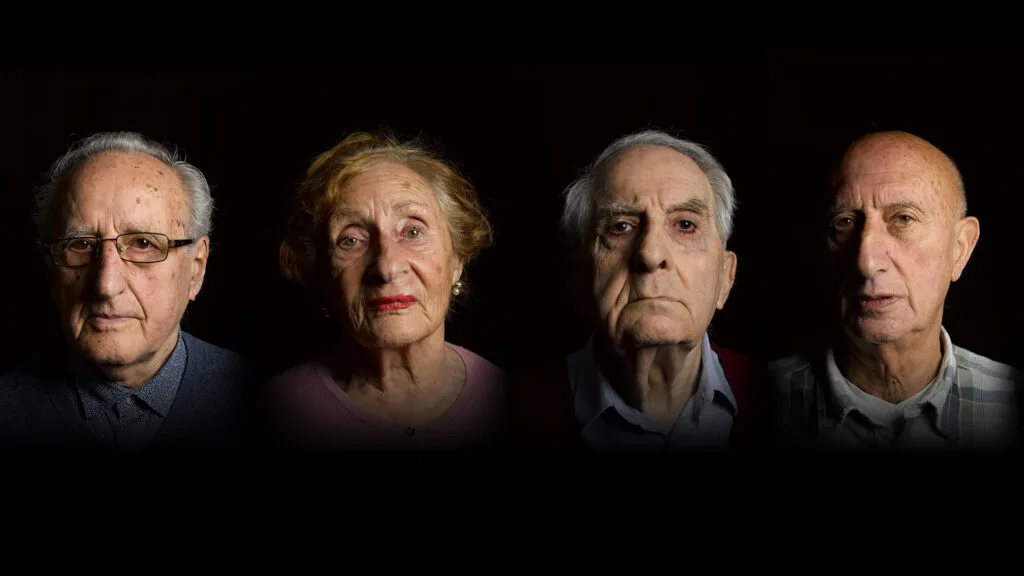On April 30, FRONTLINE Shares the Stories of “The Last Survivors” of The Holocaust

April 10, 2019
Share
The Last Survivors https://cms.prod.frol.us/wgbh/frontline/film/the-last-survivors Tues. April 30, 2019, at 10/9c on PBS & online www.facebook.com/frontline | Twitter: @frontlinepbs Instagram: @frontlinepbs | YouTube: youtube.com/frontline
As young children, they lived through “humanity’s darkest hour.” Now, over 70 years after World War II, FRONTLINE speaks with some of the last remaining survivors of the Holocaust, in The Last Survivors, airing Tuesday, April 30, 2019, at 10/9c on PBS, PBS.org/frontline, and the PBS Video App.
“We are the last ones, when we’ve gone…. Then it’s all history books,” Anita Lasker-Wallfisch tells FRONTLINE.
Drawing on intimate interviews with victims and family members, Director Arthur Cary presents a haunting look at how disturbing childhood experiences and unimaginable loss have impacted the daily lives and relationships of survivors – from survivor’s guilt, to crisis of faith, to second-generation trauma.
“Once we were incarcerated in the camps… I think we tended to grow up pretty fast,” says Manfred Goldberg, who opens up about what he experienced during the Holocaust for the first time on camera.
Goldberg recalls that after returning from a day of hard labor at the Auschwitz concentration camp, his little brother Herman appeared to have “vanished from the face of the Earth.” Goldberg had wondered what happened to Herman ever since that day: “I have never recited any memorial prayer on his behalf, always making myself believe that maybe he’s still alive.”
The film follows Goldberg as he returns to his childhood hometown in Germany for the first time since 1946, capturing the moment he finally acknowledges and grapples with the death of his little brother.
Cary also accompanies other Holocaust survivors on the personal and profound journeys of reconciling their indelible grief throughout the film. Among others, we also meet:
- Ivor Perl, who tries to open up to his daughter about the deep pain and anguish he experienced by returning to Auschwitz with her. His daughter, Judy, suffers from second-generation trauma.
- Maurice Blik, an accomplished sculptor who remains haunted by not knowing exactly what happened to his father in the Holocaust: “It’s always been a struggle…how do you deal with that loss and my need to somehow bring my father back to life?” His wife says that many of the faces on his sculptures have an uncanny resemblance to pictures of Maurice’s father.
- Susan Pollack, who vividly recalls her arrival at Auschwitz. “I remember the arriving very clearly, when the doors opened up. And the terror and the aggression hit us immediately…. We were dehumanized from the beginning,” she says. Pollack also remembers the last moment she saw her mother before she was sent to the gas chambers: “There was no parting words. There was just a hug and ‘I love you.’”
- Anita Lasker-Wallfisch, a German Holocaust survivor who delivers a powerful warning to the Bundestag, the German federal government: “Hate is poison, and ultimately those who hate poison themselves.… The future lies in your hands.”
The Last Survivors paints a portrait of what is most troubling to many Holocaust survivors as they contemplate reaching the end of their lives – specifically the rise in anti-Semitic sentiments around the world.
Lasker-Wallfisch tells the German government she fears that history could repeat itself: “We cannot blame today’s young people if they refuse to identify with these crimes….But to deny that this is part of German history as well, that must not happen.”
“Time is marching on and it will not be long before there will be no first-hand survivors alive,” says Manfred Goldberg. “And it is important to record this testimony as evidence for future generations.”
Credits The Last Survivors is a Minnow Films production for BBC and WGBH/FRONTLINE. The producer and director is Arthur Cary. The senior producer is Dan Edge. The executive producer of FRONTLINE is Raney Aronson-Rath.
About FRONTLINE FRONTLINE, U.S. television’s longest running investigative documentary series, explores the issues of our times through powerful storytelling. FRONTLINE has won every major journalism and broadcasting award, including 91 Emmy Awards and 20 Peabody Awards. Visit pbs.org/frontline and follow us on Twitter, Facebook, Instagram, YouTube, Tumblr and Google+ to learn more. FRONTLINE is produced by WGBH Boston and is broadcast nationwide on PBS. Funding for FRONTLINE is provided through the support of PBS viewers and by the Corporation for Public Broadcasting. Major funding for FRONTLINE is provided by The John D. and Catherine T. MacArthur Foundation and the Ford Foundation. Additional funding is provided by the Abrams Foundation, the Park Foundation, the John and Helen Glessner Family Trust, and the FRONTLINE Journalism Fund with major support from Jon and Jo Ann Hagler on behalf of the Jon L. Hagler Foundation.
Press Contact: frontlinemedia@wgbh.org , 617.300.5375
Latest Documentaries
Explore
Policies
Teacher Center
Funding for FRONTLINE is provided through the support of PBS viewers and by the Corporation for Public Broadcasting, with major support from Ford Foundation. Additional funding is provided the Abrams Foundation, Park Foundation, John D. and Catherine T. MacArthur Foundation, Heising-Simons Foundation, and the FRONTLINE Trust, with major support from Jon and Jo Ann Hagler on behalf of the Jon L. Hagler Foundation, and additional support from Koo and Patricia Yuen. FRONTLINE is a registered trademark of WGBH Educational Foundation. Web Site Copyright ©1995-2025 WGBH Educational Foundation. PBS is a 501(c)(3) not-for-profit organization.



















